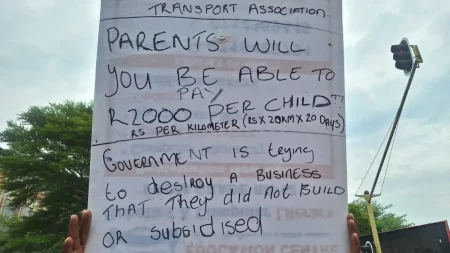Emergency services across Gauteng and other provinces are on high alert as heavy rains are expected to continue until Thursday. The South African Weather Service (SAWS) has issued warnings about localized flooding, especially in low-lying areas and informal settlements.
The provinces most affected by the heavy rains include Gauteng, Mpumalanga, and North West, where persistent downpours may disrupt daily activities and pose risks to vulnerable communities. Authorities in Johannesburg, Tshwane, and Ekurhuleni have deployed emergency teams to monitor high-risk areas and respond to possible disasters.
Today’s Weather Forecast –17 February 2025
Severe Weather Warning: What to Expect
SAWS has issued an Orange Level 5 warning for heavy rains, which means:
- Continuous and intense rainfall, leading to localized flooding.
- Dangerous driving conditions caused by reduced visibility and slippery roads.
- Rising water levels in rivers and streams, increasing the risk of flash floods.
- Possible power outages due to weather-related damages.
The heavy rains are expected to persist until Thursday, with thunderstorms adding to the severity of the weather conditions.
Emergency Services on High Alert
Authorities across Gauteng and other affected provinces have mobilized disaster management teams to respond quickly to any emergencies related to the heavy rains.
Johannesburg Emergency Services
The Johannesburg Emergency Management Services (EMS) has set up monitoring teams in all seven city regions. Their primary focus is on informal settlements and flood-prone areas that could be severely impacted by the heavy rains.
According to EMS spokesperson Robert Mulaudzi, their Aquatic Rescue Unit is on standby to assist people trapped by flooding. He urged residents to avoid low-lying areas and report emergencies immediately.
Tshwane Emergency Services
The City of Tshwane Emergency Services has also issued a public advisory urging residents to stay indoors when possible and to avoid crossing flooded roads. Spokesperson Lindsay Zwelithini Mnguni emphasized the importance of monitoring weather updates as the heavy rains persist.
Flooding Risks in Informal Settlements
The heavy rains pose a serious risk to people living in informal settlements, where poor drainage systems can quickly lead to severe flooding.
Some of the most vulnerable areas in Gauteng include:
- Alexandra
- Diepsloot
- Soweto
- Mamelodi
- Parts of Tembisa
Past rainstorms have caused devastating floods in these areas, resulting in evacuations, property damage, and even loss of life. Authorities strongly advise residents to be vigilant and take necessary precautions as the heavy rains continue.
Motorists Warned to Drive with Caution
With heavy rains making roads dangerous, motorists are being urged to drive carefully. The South African National Roads Agency (SANRAL) and Gauteng Traffic Police have issued safety tips, including:
- Reducing speed and maintaining a safe following distance.
- Avoiding flooded roads and low-lying bridges.
- Keeping headlights on for better visibility.
- Watching out for fallen trees, debris, and potholes caused by heavy rains.
Several major highways, including the N1, N3, N4, and R21, may be affected by flooding and heavy traffic congestion.
How to Stay Safe During Heavy Rains
With the heavy rains expected to continue, residents should take precautions to ensure their safety:
- Stay indoors whenever possible and avoid unnecessary travel.
- Prepare an emergency kit with food, water, flashlights, and first-aid supplies.
- Avoid flood-prone areas—move to higher ground if necessary.
- Report emergencies immediately to the relevant authorities.
- Secure outdoor objects that could be blown away by strong winds.
- Do not attempt to cross flooded roads or rivers, as even shallow water can be dangerous.
Impact on Drought-Affected Areas
While the heavy rains are causing disruptions, they could also provide relief to areas suffering from water shortages. Some regions in Limpopo and the Free State have been experiencing low dam levels, and this rainfall could help replenish water reserves.
However, authorities remain focused on the immediate danger that the heavy rains pose to communities at risk of flooding.
Emergency Contact Numbers
Residents in affected areas should report emergencies to:
- Johannesburg Emergency Services: 📞 011 375 5911
- Tshwane Emergency Services: 📞 107 (landline) or 012 358 6300 (mobile)
- Ekurhuleni Emergency Services: 📞 011 458 0911
- SA Weather Service Updates: 📞 082 233 9800
The heavy rains are expected to continue until Thursday, bringing significant risks of flooding and disruptions across Gauteng, Mpumalanga, and North West.
With emergency services on high alert, residents must remain vigilant, take necessary precautions, and stay informed. If you live in a flood-prone area, avoid high-risk locations and follow official safety guidelines.
By staying prepared, we can minimize the impact of these heavy rains and protect our communities during this extreme weather event.










